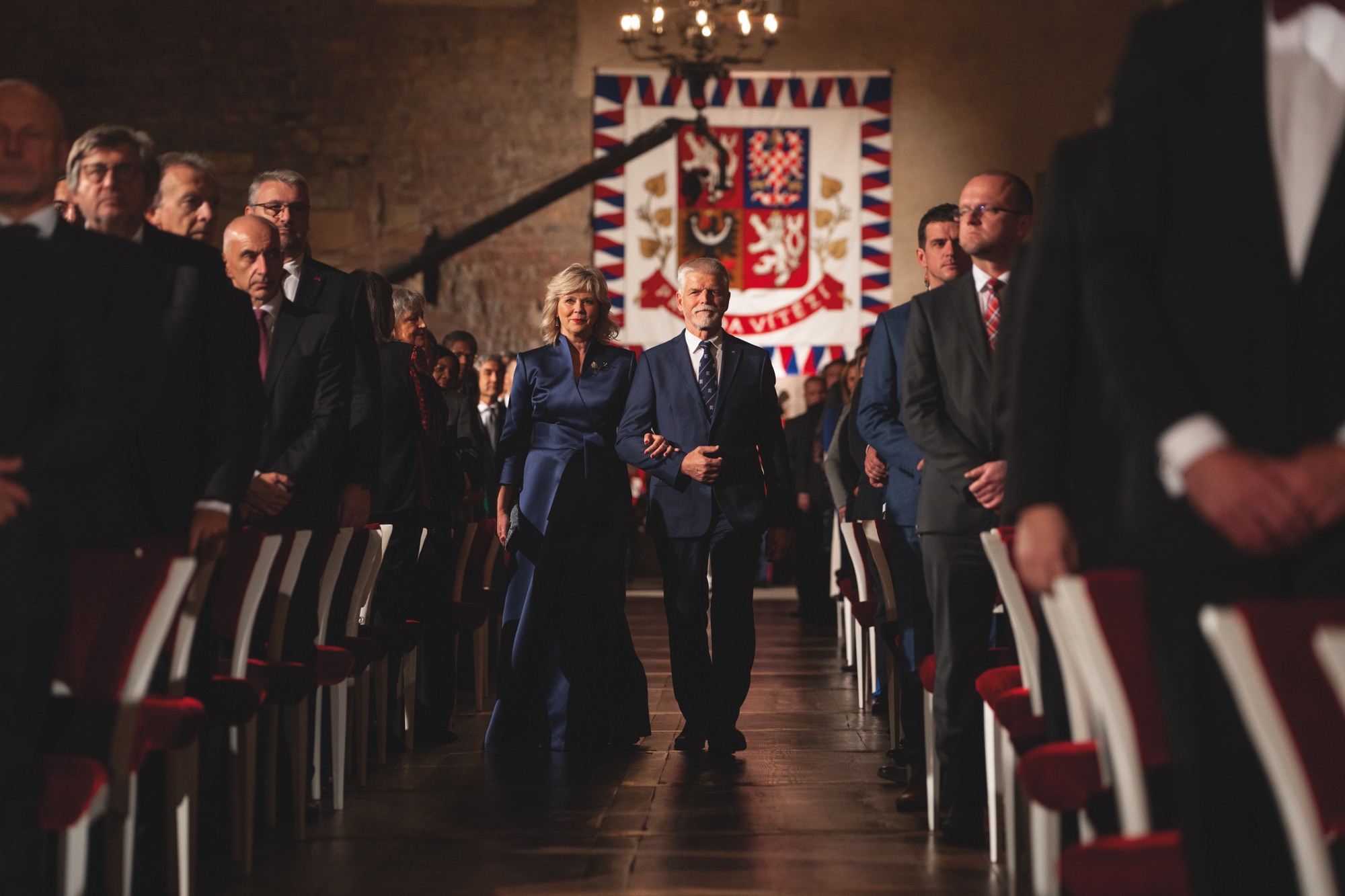
President Petr Pavel and First Lady Eva Pavlová enter the Vladislav Hall at Prague Castle
Source: The Office of the President of the Czech Republic; Photo: Zuzana Bönisch, Tomáš Fongus
At a ceremony marking Czechoslovak Independence Day on October 28th, President Petr Pavel handed out the high state awards to people for their outstanding services to the state.
We would like to present the President‘s full speech, which he delivered on this special occasion at the historical Vladislav Hall at Prague Castle.
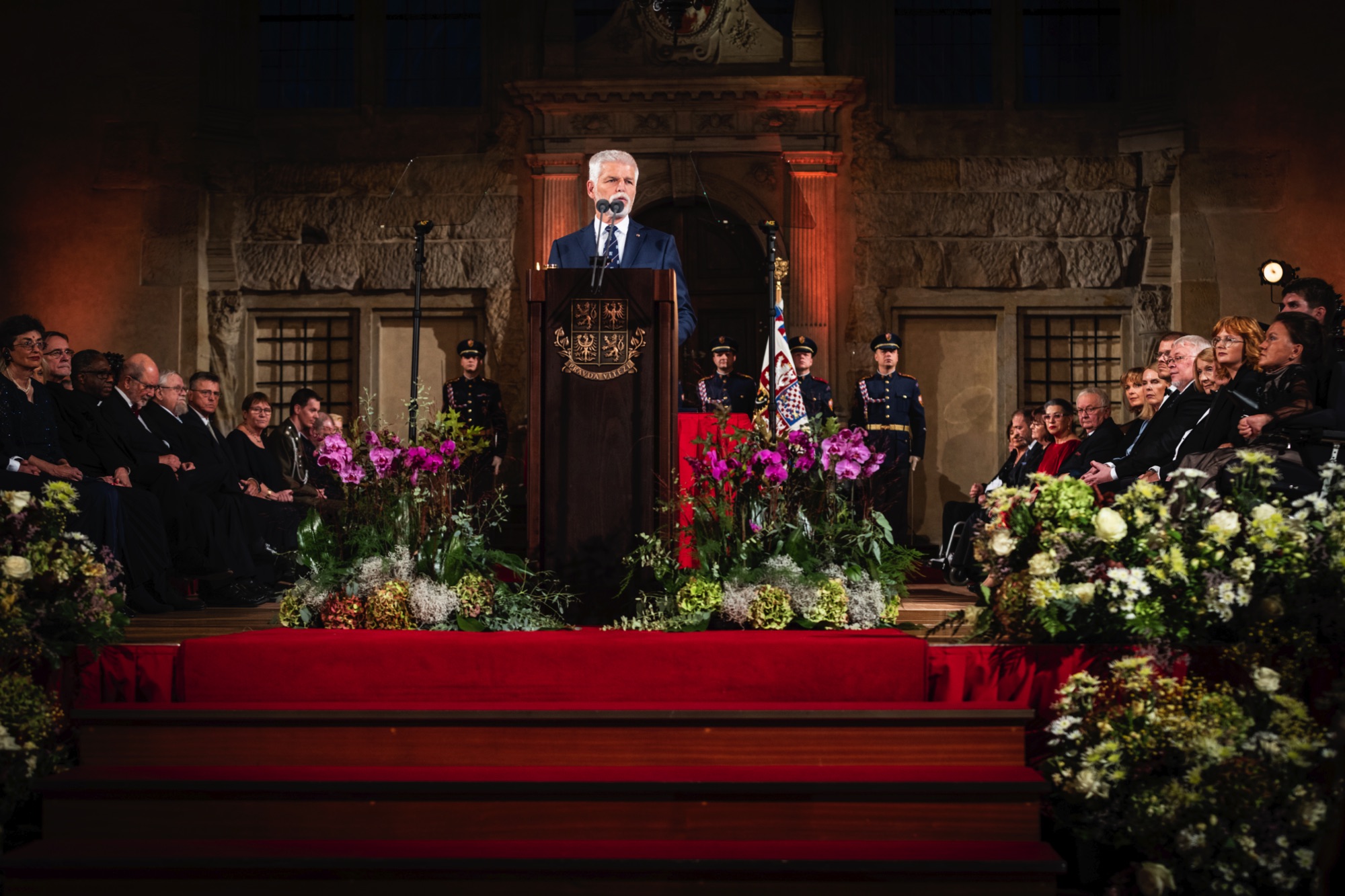
President Petr Pavel
Dear Mr. President Klaus, dear Mrs. Klaus, dear Mrs. Havel, distinguished constitutional officers, distinguished dignitaries, members of the diplomatic corps, distinguished guests, dear fellow citizens.
It is an honour to be able to celebrate one of the most favourable turning points in the history of our country with you again in the premises of the Vladislav Hall.
We see the emergence of an independent state as a happy event, as a great gift for all future generations. And that is why October 28th should also be an occasion to remember what a gift, but also a responsibility, we have been given.
It is the privilege of one’s own country, won through personal courage and persistent effort, but also through heroism and many sacrifices. This privilege was confirmed 35 years ago, when our society, bound by the totalitarian era, was able to assert its desire for freedom. It is also a gift that, unlike many other parts of the world, we live in the longest period of freedom, security, peace, and economic prosperity in history. At the same time, we are fortunate to be inspired and guided by the values of people whose actions, perseverance, philanthropy, artistic and athletic talents, and life’s work are celebrated on this day.
The recognition of the merits of these people is a symbol of the enduring respect for the original ideals of Czech statehood and the continuation of its best traditions. As well as the assurance that a democratic republic is first and foremost a community of citizens, of concrete people, and their actions.
I would therefore like to make an appeal – surrounded by the personalities we appreciate today and whose stories are models of an active and responsible attitude to life – to be inspired and to not succumb to apathy. Not to be passive observers, commentators, or cheap critics of public affairs, but to be actors in them.
It is not the easiest path. It doesn’t even have to be the most natural thing for a person to do. But just as we are actively and resolutely engaging in our personal lives for the betterment of ourselves and our children in the future, we should also engage in our society and our country. To pass them on to future generations in a condition we can be proud of. Or at least one we won’t be ashamed of.
We are celebrating the birth of a state that was built on the ideals of sovereignty, freedom, humanity, respect for man, and international law. Many of us today, and quite understandably so, take such privileges for granted. Young people, and even middle-aged people, did not grow up behind the iron and information curtain of communism. Therefore, it is not surprising that, for many of them, democracy is not something to be thankful for or even worried about losing.
More than ever, and not only today, we must therefore remind ourselves how fragile democracy really is, and that we must constantly take care of it. How difficult, time-consuming, and often painful it has been to build and nurture it, and how easy – and at first unnoticed – it can be to lose it again.
Today, unfortunately, we don’t have to look far beyond our borders to realize how easily and quickly the foundations of democracy can be eroded. Unfortunately, we don’t even have to look hard for examples of aggressive violations of international law or examples of states whose leadership endangers the future of their own country, often just in the name of personal gain and prestige or the preservation of face.
It would be the saddest scenario for our country if it went in the same direction.
So, let’s also celebrate the fact that we have our country and its future in our own hands. It is shaped by the way we act, by the values and criteria according to which we make decisions, by the things we pursue, and the commitment with which we do it.
Often, far too often, in recent years we have heard that we want completely opposite things. That our ideas of the world divide us into two irreconcilable camps.
And I still believe that is not true.
Naturally, there are issues that we do not all view in the same way. We are looking for different solutions to the problems that bother us. But it is also clear that it’s not just black and white, or that we must stand on one side or the other. Such a view of society is not just an oversimplification, it is a misleading distortion. In fact, there are very few issues that would divide Czech society in half. Personally, I will continue to strive to ensure that there are not more of them in the public debate. Above all, to avoid hatred, which has never brought any good.
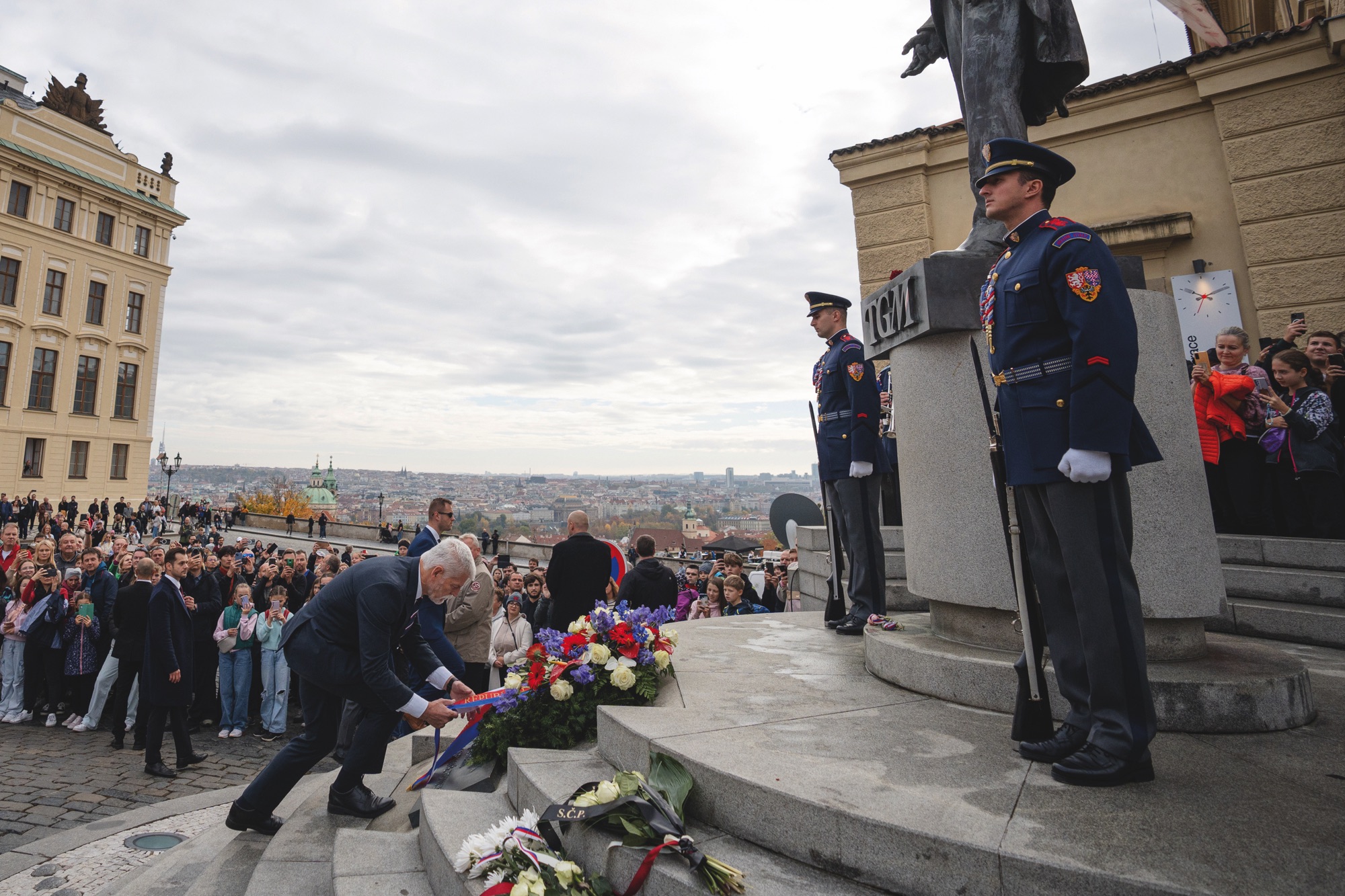
Before the ceremony that took place at the historical Vladislav Hall at Prague Castle, President Petr Pavel placed a wreath at President Masaryk’s statue on Prague’s Hradčany Square
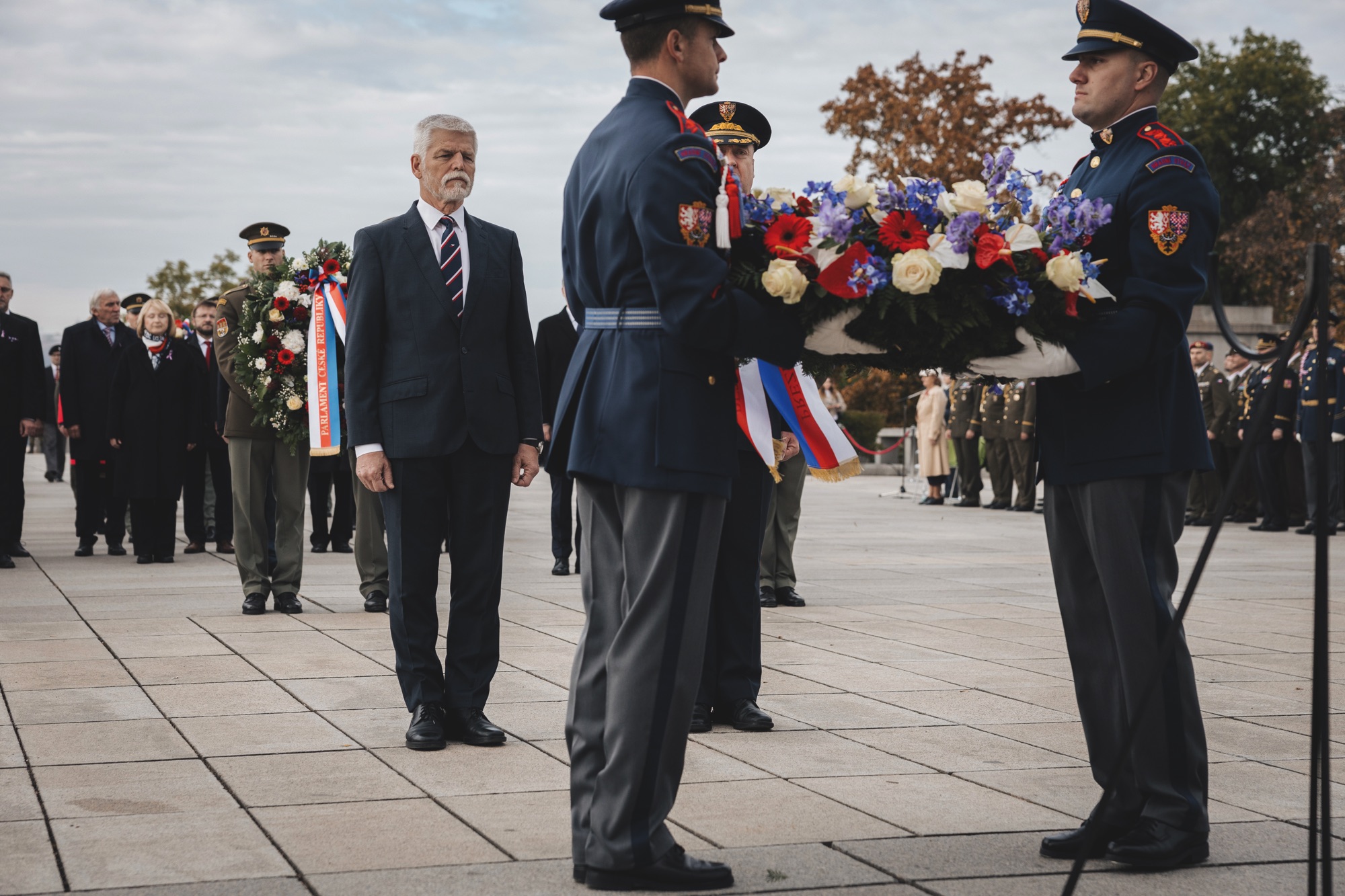
The commemorative ceremony at the Vítkov Memorial
Hatred and lies don’t do us any good.
Allow me to briefly return to our recent flood crisis experience. Six people lost their lives, and many people lost their homes, all their personal possessions, their schools, and places of work or pleasure. As in many previous crises, we witnessed great solidarity. At that moment, no one spoke about the conflicts and disagreements of society, but about the help that each of us is able to provide.
Most didn’t even talk about a dysfunctional state in which they would lose faith. Most of us listened to the advice of experts, rescue workers, officials, even politicians. We trusted that decisions were made by competent, responsible, and prepared people. Most of us relied on traditional media, which, unlike social media, consistently provided relevant, reliable, and quality information.
This reflects greatly on our society.
On the other hand, at such moments, I am struck by the motivations of people who go in the opposite direction. And who without erudition and responsibility spread lies or various half-truths. They undermine trust in institutions, science, and facts. It makes our society less resilient. Because trust, based on experience, that the system works is key. And that is for all crises, including future ones.
Most of the time, we don’t know what difficulties lie ahead. Crisis situations are critical precisely because they often come unexpectedly. But we can already mitigate their potential impacts right now. Not only we as citizens, but all components of our state, including the legislation, need to be better prepared for difficult situations.
This is all the more true of the threats we are well aware of. These are global threats. Climate, health, migration, energy, security, and technology related. The kind for which there are no simple solutions. Still, we should ask ourselves uncomfortable questions about what and how we will take action when they hit us even harder, and prepare for possible scenarios.
I understand all those who perceive these complex problems of our world with concern or fear. No doubt they are complicated, but almost every problem has a solution, and every step forward is better than standing still.
Therefore, let’s look for such personalities to lead our country – those who will not shy away from these questions. Let’s see who is dealing with the real issues and who is creating artificial battlefields over irrelevant, transient things. Such politicians only drain our attention.
Let’s try to look to those who offer viable visions and have concrete, fact-based plans to fulfil them, not those who build nothing but a pie in the sky and fight hollow battles. Let’s finally define what is essential to our country. A strong society is educated, economically viable, innovative, tolerant, has a developed infrastructure, and is one where everyone is entitled to their rights. One that takes care of the weak and vulnerable.
To be such a society means to perform a number of specific, challenging tasks.
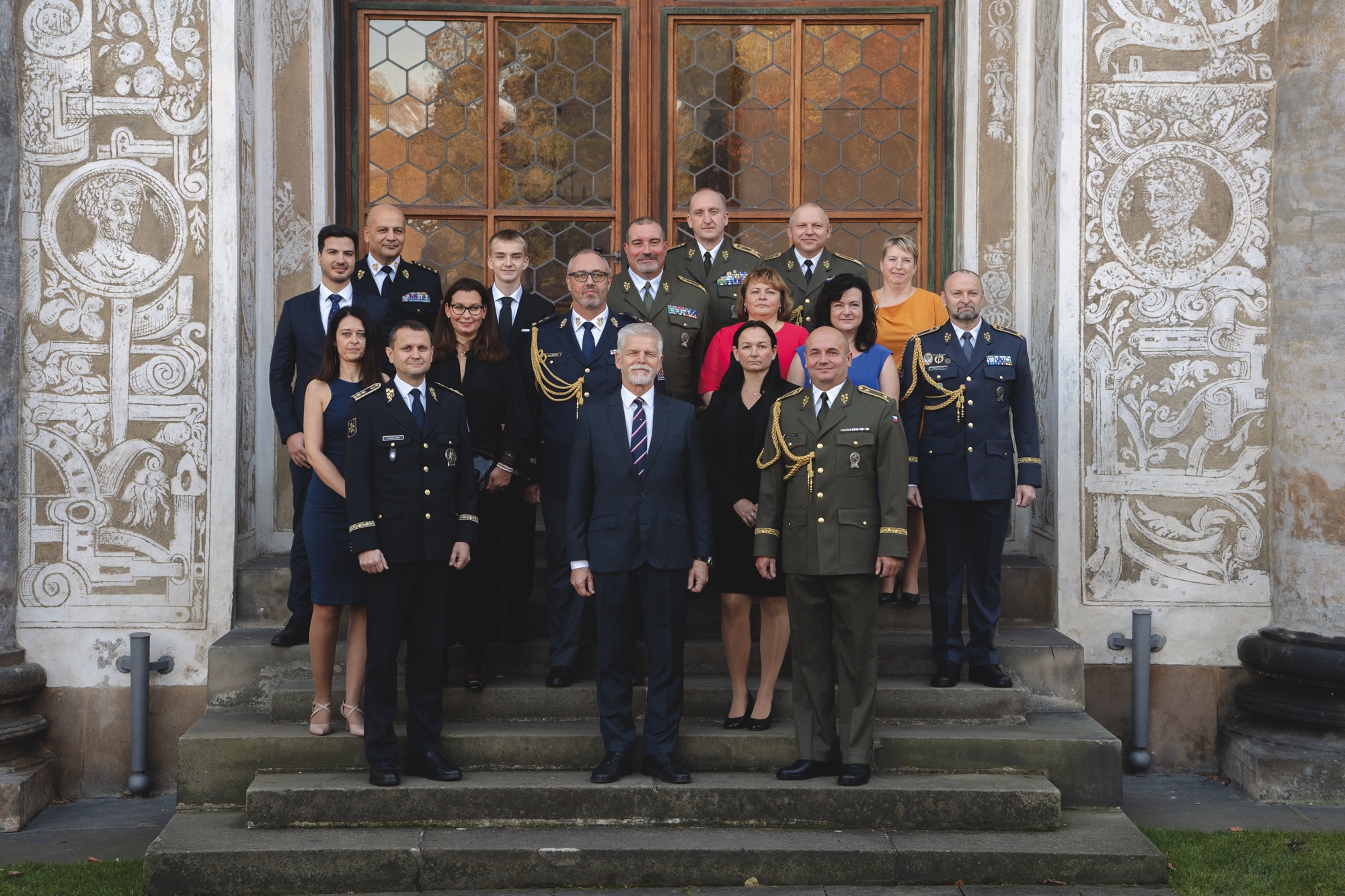
The President of the Republic, Petr Pavel, appointed the following soldiers and members of the security forces of the Czech Republic to the rank of generals:
Brigadier General Ing. Petr Bartovský, MPA, Director of Military Intelligence, to the rank of Major General
Brigadier General Ing. Pavel Lipka, Deputy Chief of the General Staff – Chief of Staff, to the rank of Major General
Brigadier General Ing. Jiří Roček, Chief of the Military Police, to the rank of Major General
Colonel gst. Ing. Miroslav Havelka, Deputy Director of the Capability Planning Section of the Ministry of Defense, to the rank of Brigadier General
Colonel gst. Ing. Přemysl Horáček, MPA, First Deputy Director of Military Intelligence, to the rank of Brigadier General
Major General Mgr. Simon Michailidis, MBA, Director General of the Prison Service of the Czech Republic, to the rank of Lieutenant General
Brigadier General Mgr. Marek Šimandl, MPA, Director General of the General Directorate of Customs of the Czech Republic, to the rank of Major General
Brigadier General Mgr. Tomáš Kubík, Deputy Police Chief for the Criminal Police and Investigation Service, to the rank of Major General
We experienced this after 1989, when changes were taking place that required profound reforms. They were not likeable. They were difficult to achieve. Mistakes were made. But we wanted to lay the foundations for future prosperity, and saw a common goal that made sense to us, and for which we were willing to share even the unpleasant cost of these changes. Today – as back then – fundamental reforms are needed to respond to the new needs of the Czech Republic, to the new needs of the people. And for this, we must learn to find consensus –political and social.
We need pension reform, we need real reforms in health care, justice, education, environmental protection, digitization, taxation and public administration, and in the organisation of the country. All these extremely complex tasks are a necessary prerequisite for the quality of life in the Czech Republic not to decrease.
Therefore, I will not support politicians who offer easy solutions and take the path of least resistance.
On the contrary, those who have the courage and the responsibility to tackle unpopular issues can count on my support. So, let’s appreciate the political courage that is being shown in trying to deal with the pressing issues facing our country. And let us trust that a responsible approach will win out in the end. After all, it should win in each of us. Because luck alone is never enough. The commitment we owe to our country should be no less than that felt just a few generations ago by those who earned our statehood.
Our approach to this will determine the kind of society, the kind of opportunities, and the kind of hopes that we and especially our children are going to live in.
Thank you for your attention.
Petr Pavel, President of the Republic, Prague Castle 28th October, 2024

